Post-Trial Responsibilities

Ethics and Implementation
Conference Description
Who:
Clinical research sponsors, investigators, funders, regulators, trial participants, and other stakeholders
Introduction / Background:
The term “post-trial access” is used broadly to connote a wide range of possibilities for providing continued access to study interventions (and potentially other care) once a trial is over, or a subject’s participation has ended. For the purposes of this conference, we focused discussions on the following:
Law, policy, and guidance are vague, sometimes conflicting, and generally lacking in concrete solutions for questions regarding post-trial responsibilities. The issues are complex and demand thoughtful discourse to move the clinical trial enterprise towards meaningful solutions. Areas that currently lack clarity include:
This conference brought together diverse stakeholders to address some of these questions.
Objectives:
Agenda:
7:30 – 8:00am Participants Arrive, Breakfast, and Registration
8:00 – 8:05am Welcome Remarks
8:05 – 8:15am The Potential Scope of the Post-Trial Access Issue
Session I: Setting the Stage (Moderator: I. Glenn Cohen)
Objective: To introduce current ethical and regulatory approaches, as well as key controversies.
10:00 – 10:15am Break
Session II: Important Perspectives (Moderator: Barbara Bierer)
Objective: To convey the range of stakeholder perspectives and current approaches from sponsors, regulators, patients, and investigators, and identify areas of convergence and divergence
12:15 – 12:45pm Short break to pick up lunch, reseat for next session
Session III: Lessons Learned: Case Studies on Implementing Post-Trial Responsibilities (Moderator: Holly Fernandez Lynch)
Objective: To better understand real world experiences implementing post-trial responsibilities, including both successes and failures, and to more clearly articulate and assess the complexities involved.
2:35 – 2:45pm Break
Session IV: Working Toward Solutions: Group Discussion of Hypothetical Post-Trial Scenarios (Moderator: Mark Barnes)
Download the Hypothetical Post-Trial Scenarios that will be discussed here.
Session V: Wrap Up (Moderator: Barbara Bierer)
Sponsored by the Petrie-Flom Center for Health Law Policy, Biotechnology, and Bioethics at Harvard Law School and the Multi-Regional Clinical Trials Center at Harvard University and cosponsored by the Center for Bioethics at Harvard Medical School, with support from the Oswald DeN. Cammann Fund.



